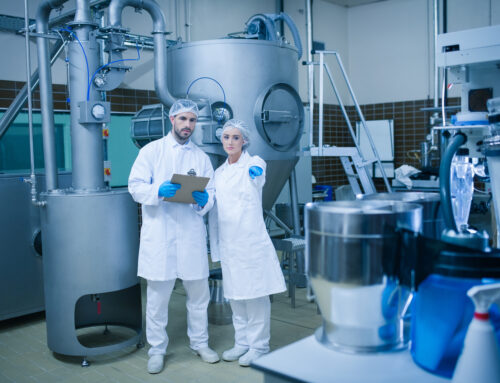Want to build a loyal customer base in the food industry? It all begins with your ability to deliver consistent, high-quality products to your customers. From taste and texture to packaging, consumers expect a consistent and reliable product experience – and they will choose the products they can trust the most.
After all, why would a consumer choose your product if they weren’t sure they’d get the same quality each time they made a purchase?
That is exactly why so many food manufacturers embrace ISO 9001, the international standard for building a quality management system (QMS).
In today’s blog post, we’ll explore how ISO 9001 compliance for the food industry helps manufacturers deliver high-quality products that exceed expectations and create long-term customer loyalty.

Understanding ISO 9001 in Food Manufacturing
ISO 9001 is an international standard that provides a framework for implementing a QMS in an organization.
Utilizing ISO 9001 in food manufacturing makes it possible for manufacturers to create consistent, high-quality products. It’s why ISO 9001 is one of the most widely adopted standards by food manufacturers worldwide.
By adopting ISO 9001, food manufacturers establish a powerful system for managing quality. The QMS system documents each step in the manufacturing process, from resource management and production to delivery.
ISO 9001 empowers manufacturers to document work instructions, polices and procedures, as well as create training resources and inspection checklists that ensure everyone from floor to management understands their roles and responsibilities.
This standard also gives manufacturers the tools to implement a system of continuous improvement that allows them to regularly review their methods and streamline them to reduce waste and increase profitability.
Perhaps most importantly, by achieving ISO 9001 certification in the food industry, manufacturers signal a commitment to quality that can open doors to business opportunities that would otherwise be unavailable. Many businesses both domestically and abroad require their food manufacturing partners to have ISO 9001 certification.
The Seven Fundamental Principles of ISO 9001
ISO 9001 is built upon seven fundamental principles, which can be adapted to the food manufacturing industry:
- Customer Focus – Understanding and exceeding customer requirements and expectations, using high-quality ingredients and labeling products for allergens and dietary restrictions.
- Leadership – Leaders must establish a quality-focused culture where everyone is aligned with food safety objectives.
- Engagement of People – Employees at all levels must be ready to contribute to quality and safety efforts, via training and open communication with leadership.
- Process Approach – From raw materials to packaging and distribution, all processes are interconnected and must be managed closely to ensure quality and safety.
- Improvement – New ways to improve food safety and quality must be continuously sought after by analyzing data and conducting internal audits.
- Evidence-Based Decision Making – Decisions based on careful analysis of the data that you collect take away subjectivity and are more likely to produce the desired result.
- Relationship Management – Building strong relationships with suppliers, distributors, and other stakeholders creates sustained success and ensures the safety of the entire food supply chain.
Benefits of ISO 9001 in Food Production
Adopting ISO 9001 in food production brings a wide range of benefits. These include:
Enhanced Food Safety
ISO 9001 emphasizes control and traceability at each step in the food production process by standardizing documentation, maintaining records, and conducting internal audits. This framework also makes it possible for food manufacturers to seamlessly integrate food safety standards such as Hazard and Analysis Critical Control Points (HACCP) and the Food Safety System Certification 22000.
Increase Customer Satisfaction
ISO 9001 demands a high degree of attention to the customer’s needs and requirements. This helps organizations achieve a reliable, consistent level of product quality leading to higher customer satisfaction and loyalty, and a stronger market position.
Improved Operational Efficiency
Continuous improvement is a key focus of ISO 9001, which is achieved through the Plan, Do, Check, Act (PDCA) methodology. This technique allows food manufacturers to constantly review and streamline their processes and identify and eliminate waste.
Attract More Customers
Holding ISO 9001 certification signals to prospective partners that your organization is committed to food safety and quality. Food manufacturers that have ISO 9001 certification are more likely to win contracts and open doors where ISO 9001 is required to do business.
Reduced Risk
A QMS provides a greater degree of control over every aspect of food production, minimizing the risk of food safety incidents. Thorough record keeping and regular internal audits help you reduce liability in the event of an incident.
The Challenges of Achieving ISO 9001
Successfully implementing ISO 9001 requires overcoming several challenges, many of which can be mitigated by partnering with an experienced provider of ISO 9001 consultant services like Manex.
Some of the most common challenges we see include:
- Resistance to Change – Implementing ISO 9001 compliance for food manufacturers can be disruptive to existing workflows and can be met with resistance by employees.
- Limited Resources – Conducting training and preparing documentation can divert resources away from your daily operations, particularly for small businesses. Working with a consultant can minimize the impact on your operations.
- Understanding the Requirements – Because ISO 9001 is not industry specific, it can be difficult to understand how the standards should be applied to food production. Working with a dedicated ISO 9001 consultant for food safety like Manex will help you understand how to apply the standard to your organization.
- Commitment from the Entire Organization – Formal training from an experienced ISO 9001 consultant service provider makes it easier for everyone to get on board and maintain the momentum of the QMS.
ISO 9001 Compliance for Food Manufacturers
Achieving compliance with ISO 9001 for food manufacturing involves a multifaceted approach. Here is what you’ll need to do before undergoing the certification audit:
- Gap Analysis – The first step is understanding how your current process stacks up against ISO 9001 requirements, a process called gap analysis. A gap analysis will reveal your current shortcomings along with areas for improvement.
- QMS Development – Document your policies and procedures to close the gap for each step in the manufacturing process, with a focus on accurate record keeping and traceability.
- Implementation – Train your employees on the new procedures putting the QMS into practice.
- Internal Audit – Conduct an internal audit after implementation to observe the effectiveness of the changes, and to reveal any areas that need further improvement.
- Management Review – After the audit, management should review the QMS performance and further identify areas of improvement to be addressed.
- Certification Audit – Finally, a certification body accredited by the ISO must conduct an external audit to verify that your QMS meets the requirements of ISO 9001. After passing the certification audit, you will be officially recognized as ISO 9001 compliant.
Achieving ISO certification for the food industry requires thorough documentation and record keeping, so be sure that these items are readily available for auditors to review. Items and ingredients used in your processes should be easy to trace throughout the food supply chain, and through to finished products.
Once certification is achieved, you’ll need to maintain your certification through periodic audits, as well as undergoing recertification whenever a new update to the standard is issued.
The Value of ISO 9001 Consultant Services
As we’ve seen, implementing ISO 9001 certification includes a host of benefits, along with its own set of challenges.
To streamline the process and minimize disruptions in your workplace, partnering with an experienced ISO 9001 food safety consultant like Manex is a must. When you’re ready to show your commitment to food safety, contact Manex.
Manex’s ISO 9001 consultant services have a deep understanding of the standard and how it applies to the food industry. Our expertise has helped numerous organizations conduct gap analysis, compile documentation, and conduct training sessions to get their workforces up to speed.
In 30 years of working with manufacturers in industries of all types, our clients have a 100% success rate passing the external audit process. We have the necessary skills and professional credentials to bring your food safety capabilities to the next level.
Contact Manex today for a free consultation of your ISO 9001 needs, and let us show you how we can help your organization achieve your quality and safety goals.


